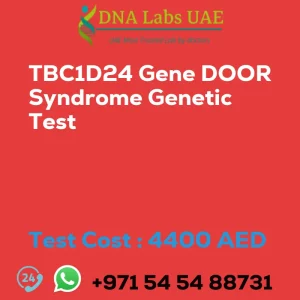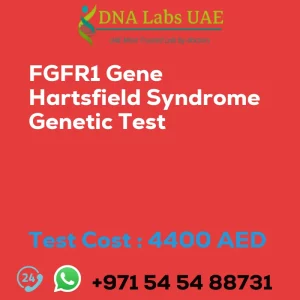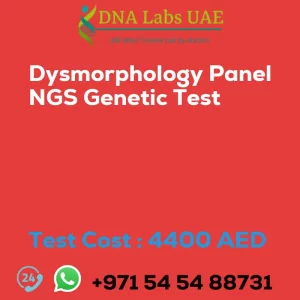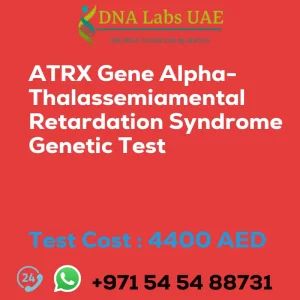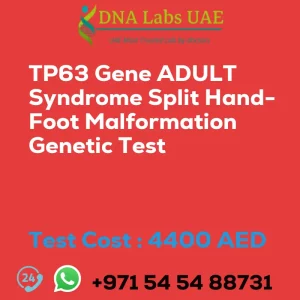FTO Gene Growth Retardation Developmental Delay Facial Dysmorphism Genetic Test
In this blog post, we will discuss the FTO gene and its association with growth retardation, developmental delay, and facial dysmorphism. We will also provide details about the genetic test for these conditions, including its components, price, sample condition, report delivery time, method, test type, doctor, and test department.
Test Name: FTO Gene Growth Retardation Developmental Delay Facial Dysmorphism Genetic Test
Components:
- Price: 4400.0 AED
Sample Condition:
Blood or Extracted DNA or One drop Blood on FTA Card
Report Delivery:
3 to 4 Weeks
Method:
NGS Technology
Test Type:
Dysmorphology
Doctor:
Pediatrics
Test Department:
Genetics
Pre Test Information
Clinical History of Patient who is going for FTO Gene Growth retardation, developmental delay, facial dysmorphism NGS Genetic DNA Test. A Genetic Counselling session to draw a pedigree chart of family members affected with FTO Gene Growth retardation, developmental delay, facial dysmorphism NGS Genetic DNA Test gene FTO.
Test Details
The FTO gene is associated with various health conditions and traits, including growth retardation, developmental delay, and facial dysmorphism. To diagnose these conditions, a next-generation sequencing (NGS) genetic test can be performed.
NGS is a high-throughput sequencing technology that allows the simultaneous analysis of multiple genes or the entire genome. It is used to identify variations or mutations in genes that may be responsible for certain genetic disorders.
In the case of FTO gene-related conditions, an NGS genetic test can analyze the FTO gene and other relevant genes to identify any mutations or variations that may be contributing to the observed symptoms. The test involves obtaining a DNA sample, usually through a blood sample or cheek swab, and sequencing the DNA to identify any abnormalities.
If a mutation or variation is identified in the FTO gene or other relevant genes, it can help confirm the diagnosis and provide valuable information for managing the condition. Genetic testing can also help in genetic counseling, family planning, and understanding the inheritance pattern of the condition.
It is important to note that genetic testing should be performed by healthcare professionals with expertise in genetics and genetic counseling. They can guide individuals and families through the testing process, interpret the results, and provide appropriate support and guidance.
| Test Name | FTO Gene Growth retardation developmental delay facial dysmorphism Genetic Test |
|---|---|
| Components | |
| Price | 4400.0 AED |
| Sample Condition | Blood or Extracted DNA or One drop Blood on FTA Card |
| Report Delivery | 3 to 4 Weeks |
| Method | NGS Technology |
| Test type | Dysmorphology |
| Doctor | Pediatrics |
| Test Department: | Genetics |
| Pre Test Information | Clinical History of Patient who is going for FTO Gene Growth retardation, developmental delay, facial dysmorphism NGS Genetic DNA Test. A Genetic Counselling session to draw a pedigree chart of family members affected with FTO Gene Growth retardation, developmental delay, facial dysmorphism NGS Genetic DNA Test gene FTO |
| Test Details |
The FTO gene is associated with various health conditions and traits, including growth retardation, developmental delay, and facial dysmorphism. To diagnose these conditions, a next-generation sequencing (NGS) genetic test can be performed. NGS is a high-throughput sequencing technology that allows the simultaneous analysis of multiple genes or the entire genome. It is used to identify variations or mutations in genes that may be responsible for certain genetic disorders. In the case of FTO gene-related conditions, an NGS genetic test can analyze the FTO gene and other relevant genes to identify any mutations or variations that may be contributing to the observed symptoms. The test involves obtaining a DNA sample, usually through a blood sample or cheek swab, and sequencing the DNA to identify any abnormalities. If a mutation or variation is identified in the FTO gene or other relevant genes, it can help confirm the diagnosis and provide valuable information for managing the condition. Genetic testing can also help in genetic counseling, family planning, and understanding the inheritance pattern of the condition. It is important to note that genetic testing should be performed by healthcare professionals with expertise in genetics and genetic counseling. They can guide individuals and families through the testing process, interpret the results, and provide appropriate support and guidance. |


